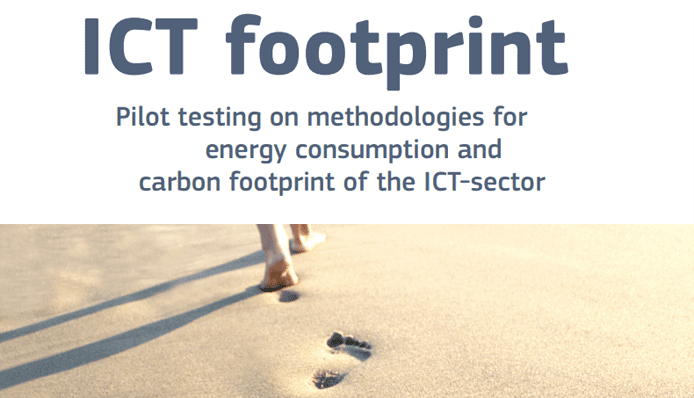
TL; DR: As one of the world’s leading consultancies for energy efficiency and climate policy, Ecofys, a Navigant company, is in a unique position to help tech-sector businesses develop more eco- and cost-friendly operations in the emerging global low-carbon economy. Due to high power consumption and cooling requirements, datacenters are prime candidates to head for greener pastures. And Navigant’s Energy Practice is helping them get there with its team of 600 consultants and environmentally focused energy solutions built to lower carbon footprints and utility bills.
In 1989, Tim Berners-Lee, a scientist at CERN, invented the World Wide Web as a means for scientists around the globe to share information. The World Wide Web went live in 1991, and Tim’s creation soon became the internet we know today, and with it came the need for hosting data. In 1992, the Energy Star program was introduced by the EPA following a growing awareness of technology’s efficiency and its impact on the environment. These new concerns had an effect on businesses, many of which turned to consultancies like Navigant to help them become more energy efficient through carbon-neutral power solutions.
Because data — such as that used to keep websites up and running — must be ever-present, datacenters depend on high-end equipment to reliably host numerous clients on a 24/7/365 basis. The inevitable result is an increase in power consumption. Additional power draws come from things like lights and cooling systems, with some larger datacenters consuming staggering amounts of energy.
According to Data Center Knowledge, datacenters in the US alone consumed approximately 70 billion kilowatt-hours of electricity in 2014 — equivalent to the power consumption of 6.4 million American households or 2% of the nation’s total energy consumption. The statistics emphasize the need for companies to be mindful of how their equipment, practices, and data usage impact their viability.

Associate Director Rolph Spaas told us how Navigant helps organizations develop eco-friendly operational strategies.
The continuous growth of big data raises efficiency concerns for many, especially within the realm of information and communications technology (ICT).
“The most important trend in the ICT world has been an increase in bandwidth and the amount of data that gets stored,” said Rolph Spaas, Associate Director at Ecofys, a Navigant company. “Some years ago, the industry reluctantly anticipated the impact of all these data increases on energy use.”
Around the time of Ecofys’s founding in the mid-1980s, a typical hard drive would have been capable of storing a measly 10 to 20MB — barely enough for a handful of modern mp3 files. Throughout the years, megabytes have turned into gigabytes and gigabytes have become terabytes. The size of files — and subsequently the size of websites — has been steadily increasing in the last three decades as the amount of information stored online continues to grow.
A Trusted Advisor To Businesses, NGOs, and Governments
Founded in 1984 by a group of university graduates, Ecofys, a Navigant company, has more than 30 years of experience in changing the way people think about energy. In 2016, the firm joined forces with Navigant, a prominent consulting agency with clients across the globe.
Together, the duo leverages the expertise of more than 600 consultants to facilitate the creation and adoption of innovative energy solutions. As such, Navigant is a trusted advisor to numerous NGOs and governments, as well as businesses in a variety of fields such as finance, ICT, and waste management.
Because nearly every organization and industry runs on electricity, it stands to reason that these companies and groups would be conscientious about how their practices, products, and rates of power consumption impact both their business operations as well as the world around them.
When Rolph joined Ecofys, there was growing concern that ICT could potentially match the carbon emissions of the aviation industry.
“Sometimes ICT companies compare themselves with the aviation industry, which is emitting 2% of the world’s emissions,” Rolph said. “What you see is that people have started flying more and more, as well as using phones and using data.”
Although ICT and aviation are vastly different, their environmental impact is potentially the same.
An Aim to Make the ICT Industry More Sustainable
Due to the rapid growth of big data, the equipment used to store important files has grown to accommodate higher capacities, which has previously lead to greater power consumption. To mitigate any massive energy draws, businesses have had to change the way they operate by implementing more efficient equipment and adopting better practices. This is especially true in the ICT industry, in which certain types of businesses must, out of necessity, consume power in datacenters 24/7.
“We see growth opportunities everywhere,” Rolph said.

Ecofys, a Navigant company, has worked ICT organizations to help reduce their power consumption and carbon footprints.
ICT’s growth opportunities cover a number of concerns such as the virtualization of servers and the implementation of efficient cooling.
“One of the main opportunities for growth we see is in the virtualization and consolidation of servers,” Rolph said. “Some companies have servers they are not fully utilizing, and by organizing them more efficiently, there is a lot to gain.”
Meanwhile, datacenters near Amsterdam have begun using nearby lakes for cooling purposes, providing an outstanding example of energy efficiency and eco-friendly business practices.
Encouraging the Global Adoption of Eco-Friendly Operations
Because carbon emissions affect the entire world in a number of ways, the adoption of green technology and eco-friendly operations is of global importance. This is not only safer for the environment, but also opens up more opportunities for economic growth — both by allowing alternative energy companies to flourish and for these rising businesses to create more jobs.
While operating entirely off renewable energy is the ideal situation, fossil fuels and carbon emissions are still widely in use and pose significant challenges to obtaining sustainability. Navigant helps encourage businesses and organizations to adopt these green standards by consulting with them to discuss environmental concerns and potential cost savings.
“It’s quite a global market. In the US, for example, there are a lot of projects related to efficient cooling,” Rolph said. “ICT companies around the world want to use electricity from renewable energy sources.”
Rolph told us another major worldwide trend is the significant cost reduction of both wind and solar power, making these energy alternatives much more viable and easy to adopt. Businesses can thus save money and the environment in one fell swoop.
Tackling Big Data’s Growing Efficiency Challenges
The primary mission of Ecofys, a Navigant company, is to provide sustainable energy for everyone. Sustainability is achieved by combining the efforts of organizations and researchers to explore renewable energy sources. Energy efficient practices not only stimulate the global economy and help businesses save money, but also protect the environment by reducing carbon emissions.
“If you look at prices for fossil fuel, they go up and down, but if you look at renewable energy prices, you know what your investment is,” Rolph said. “You know what electricity you’ll get in the next 10 or 20 years, and you also have quite a stable, low price.”
The environmental impact of the internet has been significant. As such, it is the consultancy’s goal to make ICT and big data as green as possible by encouraging practices that benefit all parties involved. Despite some companies being skeptical about alternative energy and reluctant to adopt, the use of renewable energy and greener practices has virtually no downsides — it saves money, helps generate business, keeps the earth cleaner, and stimulates the global economy.
For its efforts, Ecofys, a Navigant company, has been recognized as one of the most important European consultancies, earning a 2016 nomination to the European Business Award and receiving the 2008 Erasmus Innovation Award. 11 Ecofys consultants were also among the 2,000 scientists working on the UN Intergovernmental Panel on Climate Change, which was honored with the 2007 Nobel Peace Prize in 2007.
Energy powers our everyday lives to the point where it’s easy to take for granted. But modern society is unable to survive without it, which is why responsible organizations seek to strike the perfect balance between meeting their own needs and reducing any negative impact on the world around them. To keep things sustainable and safe means getting the most out of current technology and the available resources in the present to create a safer, more stable, and more beneficial future for businesses, governments, NGOs, and individuals all over the world.
HostingAdvice.com is a free online resource that offers valuable content and comparison services to users. To keep this resource 100% free, we receive compensation from many of the offers listed on the site. Along with key review factors, this compensation may impact how and where products appear across the site (including, for example, the order in which they appear). HostingAdvice.com does not include the entire universe of available offers. Editorial opinions expressed on the site are strictly our own and are not provided, endorsed, or approved by advertisers.
Our site is committed to publishing independent, accurate content guided by strict editorial guidelines. Before articles and reviews are published on our site, they undergo a thorough review process performed by a team of independent editors and subject-matter experts to ensure the content’s accuracy, timeliness, and impartiality. Our editorial team is separate and independent of our site’s advertisers, and the opinions they express on our site are their own. To read more about our team members and their editorial backgrounds, please visit our site’s About page.

